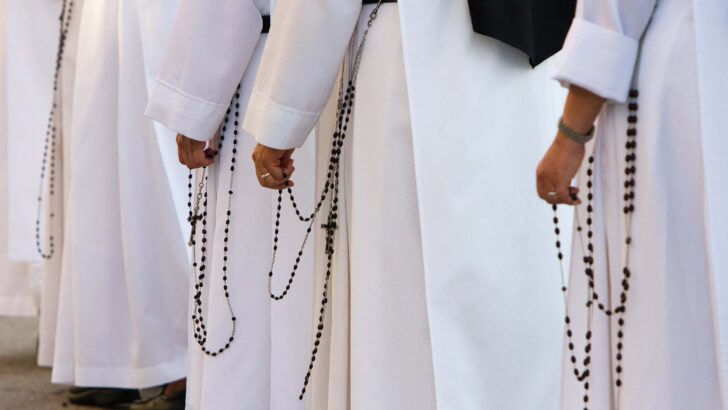Faith Development
The Dominican tradition grew out of a desire to know and love the truth, writes Fr Conor McDonough OP
Dominican friars, also known as friars preachers, belong to a global movement with roots stretching back to the 13th century. In 1216, in response to widespread confusion in the south of France concerning the truth of the Catholic Faith, St Dominic founded a community of preachers, men who would live together as brothers, making it their mission to preach the Gospel in its fullness to all sectors of society, focusing on those furthest from the life of the Church. From the beginning, these friars were part of a spiritual family which included contemplative nuns, apostolic sisters, and laypeople who associated themselves with the mission of the friars.
What marked Dominican friars out from other movements at the time – and ever since – was their focus on study and on cities. Unlike monks, who tended to live in the countryside and dedicated themselves to manual labour and the praise of God, Dominican friars would base themselves in urban centres, especially university cities, and would dedicate themselves to study for the sake of preaching. The early Dominican friars took seriously the problems of their time and the doubts of their contemporaries, and their own intellectual work was aimed at addressing these concerns. The friars engaged in study so that they could better present the truth of the Catholic Faith as coherent and attractive. They thought carefully about precisely how to communicate too: how to structure sermons, how to incorporate entertaining stories in their preaching, how to help congregations memorise important points, and how to lead people to repentance for their sins.
Reflection
This combination of popular outreach and intellectual reflection was a powerful formula, and the friars spread rapidly from their original foundation, founding priories in major cities and at the margins of Christendom. Within the first ten years of foundation there were Dominican priories as far afield as Denmark, Damascus, and Dublin. The Dominican friars who arrived in Dublin in 1224 – the first arrival here of any order of friars – made their home at the northern end of the bridge over the Liffey, outside the city walls, but they were quickly taken into the citizens’ embrace, receiving grants of alms, land, and even a supply of water. From Dublin the friars spread rapidly through Ireland, initially in areas of Anglo-Norman influence, but they very quickly received patronage from Gaelic aristocrats too. At this early stage the friars ministered across ethnic divisions by means of three languages – English, French, and Irish – and they prayed, of course, in Latin.
Wherever they were – whether in Tralee or Toombeola, Kilkenny or Kilmallock – the Dominicans were engaged in popular communication of the Christian faith. Generation after generation, with the support of a large network of lay partners, the friars prayed in their priories, and preached on the road, calling each generation of Irish people to share in the life-giving sacraments, above all Confession and the Eucharist.
This flourishing movement was dealt a near-fatal blow at the Reformation, when the friars were expelled from their ancient priories, and forced to find new ways of ministering – often in secret – to the beleaguered community of Irish Catholics. The following centuries – up to Catholic Emancipation in 1829 – was a time of extraordinary faithfulness and perseverance, and a time of many martyrs. Even amid all these challenges, however, the friars maintained their commitment to study, establishing new centres on the European continent where friars would be trained for the dangerous mission in Ireland. And wherever penal laws were not strictly enforced, the friars would take every opportunity to communicate widely, using the same mixture of erudition, humour, and creativity that characterised earlier centuries of preaching.
After the confident reconstruction of the 19th and 20th centuries, the Church in Ireland now finds itself in an entirely new situation, and a new crisis. For a wide variety of reasons many Irish Catholics have ceased to practise their faith, and belief in the central tenets of Christianity is at a historic low. Some customary attachment to the sacraments remains widespread, but this is rarely allied with understanding of, or even curiosity about, the central elements of the Christian faith. And while scandals in the life of the Church repel many from the Church, messages conveyed via the new media attract many towards lifestyles and attitudes inconsistent with Christianity. In the face of all this, those who are committed to Christian faith and life often feel isolated.
Crisis
All this means that Dominicans are uniquely placed to respond to the current crisis in Irish Christianity. We aim not at blind custom, but at true understanding; we are not inwardly focused, but seek to communicate with those at a distance from the Church; we seek by all means, including the new media, to present the Christian faith in all its rich, attractive beauty. From parish missions to the Priory Institute, from Instagram to the St Martin Magazine, this is our goal.
It’s no accident, then, that the Dominican Order in Ireland has been attracting so many vocations. The young men who have taken the Dominican habit in contemporary Ireland understand very well the challenges facing the Church, and they have, with the help of God, identified in the Dominican way of life as a means to face up to these challenges wisely and well. They recognise in the Dominican vocation a means of giving birth to communities of faith that are truly alive: not just ‘carrying on’, but creative, thoughtful, and growing.



 Dominican Sisters pray the rosary during a Marian procession in 2017. Photo: CNS/James Ramos, Texas Catholic Herald
Dominican Sisters pray the rosary during a Marian procession in 2017. Photo: CNS/James Ramos, Texas Catholic Herald 